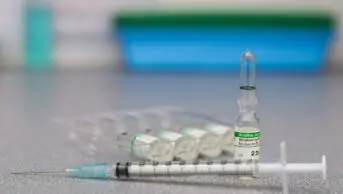
Newman Studio / Alamy Stock Photo
Serious shortage protocols (SSPs) for the antibiotic clarithromycin have been reactivated, at the same time as the number of whooping cough cases hit a 15-year high.
Two SSPs — for clarithromycin 125mg/5mL and 250mg/5mL oral suspension — were reactivated on 22 May 2024 and are set to expire on 21 June 2024.
They state that for every 5mL of clarithromycin 125mg/5mL oral suspension, 2.5mL of clarithromycin 250mg/5mL oral suspension must be supplied; and for every 5mL of clarithromycin 250mg/5mL oral suspension, one clarithromycin 250mg tablet must be supplied.
The SSPs were first introduced in April 2023 and, although originally intended to run for less than a month, were extended until December 2023.
Whooping cough cases hit a 15-year high in the first three months of 2024, according to the number of notifications from GPs collected by the UK Health Security Agency.
Clarithromycin is commonly used to treat whooping cough, and pharmacy bodies had recently warned that community pharmacies were experiencing shortages of the antibiotic.
Community Pharmacy England (CPE) said that the antibiotic had been subject to price concessions for some time, which “indicated some longer lasting pricing issues”.
Commenting on the SSPs, Gordon Hockey, director of legal at CPE, said: “We are extremely concerned about the worsening medicines supply situation, which is having a severe impact on patients and pharmacy teams.
“While SSPs can be a useful tool to help patients get the treatment they need more quickly, they are still restrictive and difficult to use, and don’t make full use of community pharmacists’ expertise. We have been pressing DHSC [the Department of Health and Social Care] to think more broadly about what else could make a difference, as well as requesting that they issue more communications on supply issues to reassure patients and the public.”
Leyla Hannbeck, chief executive of the Independent Pharmacies Association (IPA), said her organisation had previously warned that community pharmacies had been unable to source clarithromycin for patients.
“As IPA has repeatedly called for, we need a national strategy on medicines supply challenges where DHSC involves all stakeholders, including community pharmacies — this situation cannot continue,” she said.
Clarithromycin was added to the list of medicines that cannot be exported from the UK or hoarded on 22 May 2024.


